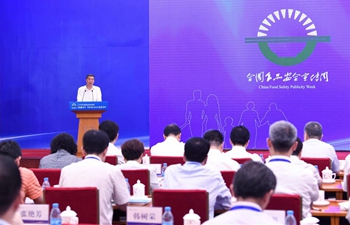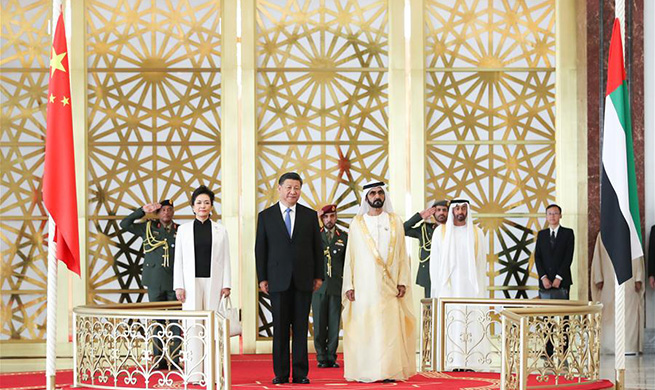by Mahmoud Fouly
CAIRO, July 19 (Xinhua) -- The Egyptian non-oil exports have been rising since the country devaluated its local currency amid an economic reform program, while China is a promising market for Egyptian products in the light of distinguished relations between the two countries, said Egyptian economic experts.
Newly appointed Trade and Industry Minister Amr Nassar said on Tuesday that Egypt's non-petroleum exports increased by 14 percent during the first half of 2018 to reach 12.75 billion U.S. dollars, from 11.21 billion dollars during the same period last year.
Egypt has been suffering economic recession over the past few years due to political instability and relevant security challenges, which led to a decline in tourism industry and foreign investment in the country.
In November 2016, the country floated its currency to contain dollar reserve shortage and reduce budget deficit as part of a strict three-year economic reform program based on austerity measures, including fuel and energy subsidy cuts and tax hikes.
"The liberalization of the Egyptian pound's exchange rate is a big opportunity for increasing our exports. To achieve this, it needs sufficient local production of goods to be exported to international markets side by side with professional marketing and promotion strategies," said Rashad Abdo, economics professor at Cairo University and head of the Egyptian Forum for Economic and Strategic Studies.
The International Monetary Fund showed support for Egypt's economic reform plan by providing a 12-billion-dollar loan, two thirds of which has already been delivered to the most populous Arab state.
Abdo described the increase of Egypt's non-oil exports as "good but insufficient," arguing that the 14-percent rise does not fully reflect the country's resources and capabilities.
"It should be much more than 14 percent due to the local currency floatation that devaluated the Egyptian pound by more than 100 percent," the professor told Xinhua.
The Egyptian trade and industry minister said earlier in July that the Egyptian exports to the Chinese market increased by 60 percent in 2017 to 408 million dollars from about 255 million dollars in 2016.
The minister also highlighted the significance of Egypt's participation in the first China International Import Expo to be held in Shanghai in November this year.
"The Egyptian exports to China should be much greater, for China is a promising, massive market ... and it is able to absorb a lot of Egyptian commodities, especially in the light of the distinguished and strong political, cultural and popular relations between the two countries," the economics professor said.
He went on saying that the standard of living and the poverty rate have completely changed in China, which has become the world's second largest economy.
China is one of Egypt's largest trade partners, with a volume of trade exchange between 10 and 11 billion dollars over the past couple of years. Chinese exports to Egypt account for about 95 percent of the total trade.
Egyptian President Abdel-Fattah al-Sisi is expected to visit Beijing in September to attend the Forum on China-Africa Cooperation Summit, amid growing Egyptian-Chinese ties elevated by the two leaderships in 2014 to the level of comprehensive strategic partnership.
"The 60-percent increase of Egyptian exports to China is good but insufficient due to the large deficit in the trade balance between the two countries," said Gamal Bayoumi, head of the Cairo-based Arab Investors Union and Egypt's former assistant foreign minister.
He recommended that Egypt should improve the quality of its products and study the Chinese market and Chinese consumer needs to increase its non-oil exports to China, noting that products made in China are widely known for their high quality and relatively lower prices.
Bayoumi described the increase of Egypt's non-oil exports as "a step in the right direction."
"All economic indicators regarding Egypt are positive, for there is a rise in the country's exports, remittances of expatriates and the foreign currency reserves thanks to the economic reform program currently adopted by the country," Bayoumi told Xinhua.
However, he noted that the Egyptian exports are still much lower than those of 2010.
"To restore our exports to the previous level, we need to re-open many closed or semi-closed factories to full operation, improve the quality of current commodities, and work on attracting further investments in production fields, particularly in industry and technology," Bayoumi added.

















